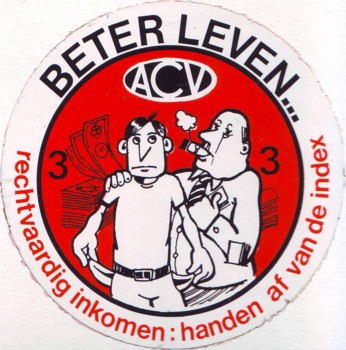
Figure 1: Sticker ACV
In a previous column it is stated, that there are sound technical arguments in favour of the socialist system of production. Yet the practical experiences are rather disappointing, or at least not durable. Why is that so? The present column tries to answer that question, and consults several sociological sources. It concerns notably Économie et sociologie by François Cusin and Daniel Benamouzig. Besides Why nations fail by Daron Acemoglu and James Robinson analyzes completely in the tradition of the Historical School the conditions for economic growth. Also Konjunktur und Wirtschafts-wachstum by Hans-Jürgen Wagener explains the economy by means of the historical approach1.
For years and years the economists like to state, that the economic system develops in an autonomous manner. On the other hand, the Historical School believes, that it is embedded in the society, and therefore it studies the relations between the economy and historical and social developments. It is said, that after the First Wordwar the Historical School has been replaced by the neoclassical paradigm, but that is not correct. She has merely abandoned the confrontation and the polemics, which she began in her first phase. Since, this current has continued, in the United States of America under the name institutionalism, and elsewhere in inter-disciplinary scientific networks. This current is not necessarily socialist, but it does attach value to the interpretation of group phenomena in a historical context.
In the nineteenth century the social misery of the proletariat is so desastrous, that a civil war seems the only way to improve its situation. The conflict between the classes of the capitalists and the workers can not be bridged. The only means of power of the workers is their numerical preponderance, which enables them to expel the capitalists by means of force. The socialism becomes the ideology of the ravaged proletariat. Incidentally, the socialist ideas have a long-standing tradition, partly religious. For in the Feudalism of the Middle Ages the agrarian society already has a strong sense of community. The liberal ideas about markets emerge only during the industrial revolution.
The core values of modern socialism are the existential security, decent work, cohesion and emancipation2. The collective property seems to be a good instrument for such ethics. The values are grounded in a rational and individualistic vision of life. For, the modern socialism pretends to be the heir of liberalism. In the beginning there are indeed experiments with production cooperatives, but that concepts turns out to be thwarted by the human nature3. Therefore the socialist dominant current soon prefers to establish the proletarian state. The state must socialize the means of production, and he must guarantee the stability by planning the production.
Against the capitalist rationality of the unbridled commodity markets the modern socialism presents its own rationality. A state-managed economy can evade many of the disadvantages of capitalism. An evident advantage is that the development can be planned at will. That makes the future less capricious, and thus better predictable. Thanks to the plan there is no destruction of capital due to failures or forced retrenchments of enterprises. This also avoids the unemployment. State enterprises are transparent, so that the best practice can become the norm. The scale of the production process can be enlarged at will. The finance is no longer a problem. The Keynesian theory yields arguments to underpin the increased stability due to redistribution of market incomes4.

Meanwhile in capitalism the form of property is transformed into capital stock. The enterprises want to benefit from advantages of scale, and need much monetary capital for their investments. This development towards savings on costs fits with the division of labour, where the competition and efficiency are leading. At the same time, due to the specialization the industry and commerce get mutually dependent and interwoven. That becomes also apparent from the management of the firm, that is delegated to a wage-earning management by the shareholders-proprietors5. The shareholders are still fragmented and have little expertise. On the one hand, this mitigates the conflict between labour and capital, because the management can mediate. On the other hand, it looks as though the form of property is irrelevant. State ownership becomes conceivable.
At the same time experience shows, that in many branches the big industries do not become the norm. Apparently it makes no sense to nationalize the industry as a whole. Merely the big industries qualify for that. In branches with smaller firms the private property remains the best guarantee, that in that branch the capital is allocated in an optimal way. Despite the big industries, capitalism and liberalism continue to glorify individualism6. The forms of organization remain diverse. The new science of organizational theory tries to find the most effective productive structures for each branch.
At the beginning of the twentieth century the situation of the workers improves. The production is mechanized, so that many exhausting tasks disappear. The wage level rises, and the first social provisions are introduced. Even better, chances of social mobility are created. This makes the social conflict less pressing or acute. The chance of a civil war diminishes. The French sociologist Emile Durkheim calls these provisions the organic solidarity, because she is based on new organs. In his view precisely the increasing complexity and competition force the people to emancipate personally. The increasing insecurity becomes a burden for the people. Durkheim believes, that professional associations can bring some relief here.
One wonder to what extend this pacification of the labour movement undermines the socialist ideology. For, precisely the class struggle has always been the backbone of modern socialism. Now that many of its material demands have been satisfied, the ideology of two irreconcilable classes becomes less credible. The class society tranforms into a mass society7. But even thought the urgency of reforms diminishes, yet the alternative of a socialist society still remains seducing. And the class conflict remains present in the milder form of the wage struggle. Incidentally, in an egalitarian society there will be more competition, and that also creates unrest8.

At the start of the twentieth century the bureaucracy proves to be successful. The German sociologist Max Weber believes that the bureaucracy is the purest form of rationality and legality. Thus she creates trust9. The social connections become institutionalized. State-enterprises turn out to often match the performance of private enterprises. That gives the impression, that the efficiency will not suffer from the nationalization of an private company.
During the first decade of the twentieth century the mass consumption begins. The big industries continue to grow, so that the role of the management of the firm becomes even more important. The enterprises establish staff departments. Production plans are developed. The management tends to sympathize with the production factor labour, which is its daily interlocutor. To management the size of the profit is less important than guarantees for the survival of the company10. The desire for more security is connected to the ever increasing economic complexity and the lack of clarity. This development is called the era of Fordism.
It has been stated just now, that Fordism favours cartels and monopolies. Capitalism turns out to create a sponaneous ordering. This makes the socialist collectivism more credible, at least for the concerned branches. A historical incident, the Great Depression of 1929, creates unforeseen chances for socialism. Unfortunately during their misery especially the German and Italian people do not choose the democratic socialist alternative, but they are seduced by the extremist fascist and Leninist parties. It becomes definitely clear, that the nature of man is not in itself "good". The statement of many leaders in the socialist movement, that capitalism is the source of all misbehaviour, is false11.
In the period immediately before and after the Second Worldwar the socialist system is a real option, and indeed after the war there are there several socialist governments in Europe. A significant part of the economy is nationalized by the state. This receives a wide social support. Yet the state enterprises turn out to have several disadvantages, notably the lack of flexibility and awareness of costs. The personnel does not serve the general interest, but is driven by self-interest. According to some the state enterprises are not very innovative, because they are not pushed by the whip of the commodity markets. For, innovations lead to painful depreciations. Besides, the modern socialism tries to curb innovations and rationalizations12. On the other hand, the defense- and space-research has produced much useful knowledge (the so-called spin-off).
Nevertheless, socialism seems promising, also thanks to the theory of Keynes, which gives it a scientific foundation. Still in 1981 the French government decides to radically nationalize the industry and commerce. Meanwhile, from the sixties the Japanese production prospers, so that the state can start massive exports. The western enterprises turn out to be insufficiently competitive. The Japanese enterprises are more innovative and less bureaucratic. It seems that the western economy can copy this system by the introduction of quality control, and by an increased flexibility. This development is beneficial for the interest of the workers, because the contents of work becomes richer13.
At the same time it becomes clear, that man according to his nature is less attached to his community than has been assumed before. The western consumers like to buy foreign products. The larger and more diverse supply of products is appreciated, not only because of the lower costs, but also as a social and cultural enrichment. Although the consumption does not need to underline the individual richness, like the economist Thorstein Veblen once suggested, yet one wants to use consumption in order to distinguish oneself from the environment. Everyone wants to be visibly unique. There is a double logic of imitation and distinction. Therefore a general standardization and uniform mass consumption lacks support14.
However, an increasing number of industrial states emerges, such as the gigantic People's Republic of China. Against this massive supply of cheap labour the western companies can not compete. The production is largely moved to states with cheap labour. Besides, the innovations succeed each other at an increasing pace, so that the enterprises must become more flexible. Loose networks of enterprises are highly effective in this respect. In this changing entrepreneurial climate neither state enterprises nor central planning of the economy are generally a real option. The Fordism ends. The western states lose their industry, and the big companies as well. This wipes out an important basis of power of the socialist ideology. An accompanying set-back is the growth of the foreign trade (the so-called globalization), which can hardly be planned15.

At the same time the distinction between the production factors labour and capital fades. Almost all workers participate in pension- and insurance-funds, and therefore they become dependent on the profitability of capital. Nowadays these so-called institutional investment funds belong to the larger players on the international capital markets. Thanks to their enormous size they exert power over enterprises and even over states. They are partly responsible for the economic instabilities, which emerge due to the volatility of the global capital currents. The financial markets decouple from the real economy. The development of short-term capital and of speculative financial products is sometimes called financialization16.
In a competitive world there is not much room for fair sharing. People withdraw from their community. The differences in income and wealth increase. This development is accompanied by a shift in the professional population. The new middle class of administrative workers and service suppliers becomes dominant. The big industries increase the use of ancillary suppliers, which must be highly competitive. Henceforth the big industries are the coordinators of their networks. Except for the direct core of the enterprise the employment is uncertain. This weakens the position of the factor labour and of the labour movement. And the power of the shareholders increases. It is a paradox, that the desire for quick profits undermines the innovative capacity of the enterprises17.
The state diminishes its efforts to organize and regulate the economy. The changing public morals reduce the legitimacy of active state interventions. The state loses the autonomy, which for instance Weber had assumed, and becomes a player among others, such as the industry and commerce. This matches the present view on society, which entertains the image of various loose networks of interest groups18. It is difficult for politics to find a widely shared common interest. The popular parties disintegrate, and the politics outsources activities to private markets. Nevertheless, the maintainance of an institutional structure remains an essential task for the state. Some sociologists even believe that the free markets are self-destructive19.
Therefore the conclusions certainly do not imply, that all forms of planning have become obsolete. On the contrary, the planning remains unabatedly necessary. However, she needs to formulate a more modest goal, namely the creation of favourable conditions for the free economic development. The state guarantees the stability. Besides, some planning will remain at the level of branches. Also state enterprises remain possible in some branches. Consider for instance the public utilities, the banks, the insurance companies, some forms of public transport, and evidently security and control. People who engage in abstract thinking, can continue to call themselves socialists. Besides, the systems of the various western states are clearly different, and some are more amenable to socialist projects than others20.
The preceding paragraph gives some insight in the requirements, that must be met by a successful economic system. A central message in the book Économie et sociologie is, that the private markets are always socially embedded. They must probably be constructed on purpose, and will collapse as soon as the institutional structures are removed. This view is closely affiliated to the original paradigm of the Historical School. In the book Waarom sommige landen rijk zijn en andere arm (English title: Why nations fail) Daron Acemoglu and James Robinson even argue, that the success or failure of the economy is totally dependent on the national peculiarities within the state.
According to the authors the first requirement for a successful economy is, that the state introduces a central government. The commerce and the industry can flourish only within a social order, which by means of laws and rules guarantees some predictability and certainty of the future. States which do not succeed in this task, such as Afghanistan, Somalia and Haïti, will suffer from poor economies.
The centralization will usually guarantee, that some economic growth begins. But the authors argue, that the growth will be only durable, as long as the national economic and political institutions are inclusive. Inclusion means, that a relatively large part of the population can participate in the political management and in the economic activities. In a society with a large participation the people dispose of individual freedom. Thus the people are incited to improve their situation by means of technical innovations. The reader knows from previous columns, that innovation is vital for economic growth.
When on the other hand the institutions are extractive, then a small elite disposes of all power. The standard example of Acemoglu and Robinson for such a system is the feudal system under the absolute rule of a king or emperor. It is obvious, that slavery, which just a century and a half ago was still common in many places in the world, is even worse. Such regimes have the problem, that the elite of that absolute state controls the economy by means of trade monopolies and the property of the natural resources. The elite wants to maintain her prerogatives. Therefore she will suppress innovations, because these offer chances to outsiders.
In states with extractive institutions merely an extensive growth is possible. For, the system does allow for an expansion of the production, but not for the introduction of innovative production methods. As soon as the existing possibilities are completely exhausted, the increase of the prosperity will stagnate. Since the elite is sufficiently powerful to exploit the people, she is hardly interested in overcoming the stagnation. For, then she could be superseded by outsiders, a process which the authors call the creative destruction, following Joseph Schumpeter21. Here the authors expect, that such states are politically unstable, because the outsiders can only gain richness by ousting the ruling elite.
A state with inclusive institutions is not hampered by these problems, because both the political management and the entrepreneurs will step back voluntarily, as soon as a rival succeeds in surpassing them. By now the whole western world disposes of an inclusive state. In South-America this is only partly so, in China even less, while central Africa (south of the Sahara, but north of South-Africa) still mainly has extractive regimes. Thus Acemoglu and Robinson draw the intriguing conclusion, that for instance the Chinese economy will stagnate in the end. The regime of the Maoist party is too repressive. China will not become the new economic superpower!
Also Hans-Jürgen Wagener can be called a heir of the Historic School. On p.81 in his book Die 101 wichtigsten Fragen - Konjunktur und Wirtschafts-wachstum he states that a continuing growth of China is conceivable. For, also Taiwan and South-Corea experienced a strong growth under a dictatorship. Wagner believes that the inclusive political institutions are caused by the prosperity, but not its cause. The extractive political institutions become damaging only, when they suppress the initiatives of the traders, for instance by discouraging the foreign trade. The international competition is an important driving force of progress.
So Wagener does acknowledge that the entrepreneurial freedom is essential for growth. For instance in the feudal China the traders and entrepreneurs were held in low esteem, and their interests were disregarded. It was not possible to establish the institutional structure, which is needed for free markets. Thus around the fourteenth century China has fallen behind western Europe, although then the Chinese technology and science were still more advanced than the European ones. In this way China finally remained on a primitive social level22.
The remarks of Wagener show, that it is true that the inclusion theory of Acemoglu and Robinson is plausible, but that she can not claim a universal validity. She is at most a tendency, which in exceptional cases may be put aside.
In the preceding text it has been argued, that the ideology of democratic socialism is still defensible, inspite of its weaknesses. On the other hand, the Leninism of the former planned economies in Eastern Europe is definitely a failure. According to Acemoglu and Robinson the reason is, that the Leninist system has always been extractive, just like China at present. The Leninists themselves have believed for a long time, that the western capitalism would resort increasingly to planning, and that finally a revolution transform it into the Leninist system. They were encouraged in their view by the Keynesian policy, which they called the state monopolistic capitalism (in short stamokap).

It is obvious that also the Leninist economists observed, that halfway the seventies of the last century the western industry states got stuck with their Keynesian growth policies. Due to the end of Fordism the labour movement weakened, so that the chance for a social revolution also decreased. Thus the new situation undermines the traditional Leninist development theory. A typical view originates from the Leninist economist Otto Reinhold in Der Marxismus-Leninismus und die politische Ökonomie der Gegenwart23. According to him in the seventies capitalism first falls into a structural crisis, which next develops into a social crisis.
Reinhold acknowledges, that in the early eighties the western states reform their social security. The new policy worsens the labour conditions and the prospects of the wage earners. At the same time there is a rise of mass unemployment. This all weakens the position of the labour unions. Now that the western states reduce their economic interventions, the policy gap with Leninism widens. At the same time Reinhold states, that the United States of America (USA) under the guidance of president Reagan start an arms race.
On p.183 of his book Reinhold states that the USA try to overcome the crisis by establishing a war economy. The rising branches of the information and communication technology (ICT) and of space research are completely placed at the service of the imperialist course. According to Reinhold the only real solution is the transition towards a Leninist system. Several years after the publication of his text that system itself was overthrown by a fortunately largly peaceful popular revolution.
The findings in the book Économie et sociologie give some clues why the Leninist system of the completely nationalized and centrally planned economy is not viable24: